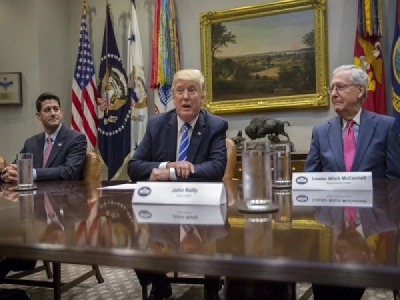
Posted on September 14, 2017
By Dino Grandoni, The Washington Post
After Hurricane Harvey ravaged Houston, the shutdown of Gulf Coast refineries strained fuel supplies in much of the United States, including Florida, which gets almost all of its oil by boat.
As Hurricane Irma menaced the Caribbean, increased demand within Florida drove up gas prices even further. There and in Puerto Rico and the U.S. Virgin Islands, emergency responders also needed fuel for rescue and recovery efforts.
So to more quickly get fuel to hurricane-hit regions, the Department of Homeland Security on Friday temporarily suspended an obscure, nearly century-old law called the Merchant Marine Act, better known as the Jones Act.
“We are worried about the fuel shortages,” White House Homeland Security adviser Tom Bossert said at the White House on Friday. “We are bringing in as much supply of refined fuel as possible, and we’ve waived a particular statute that allows for foreign-flagged vessels to help in that effort.”
By issuing a temporary stay of the Jones Act, long a bugaboo of proponents of free trade, President Trump has set off a new round of calls for reforming the law — or outright repealing it.
“Every time we have a disaster that affects U.S. maritime shipping,” said Scott Lincicome, an adjunct scholar at the Cato Institute, “the harms of the Jones Act come into focus.”
Passed in 1920, the Jones Act requires that all ships transporting goods between U.S. ports be owned and manned by U.S. citizens, and be built within U.S. shores.
Sponsored by then-Sen. Wesley Jones (R-Wash.) as a boon to shipbuilders and longshoremen in the port of Seattle, the law is lambasted today by free-trade proponents who regard it as a relic of the country’s protectionist past. Defenders of the law — which include unions and some national-security experts — say the Jones Act protects U.S. jobs and ensures the nation has the shipyards to build naval fleets if necessary.
The debate over the arcane law also stresses the tendons holding together the two halves of Trump’s political thinking. With his “energy dominance” agenda of encouraging more fossil-fuel extraction in the United States, Trump has identified himself as an ally of the oil and gas industry, which wants to rein in the shipping law that it argues raises domestic fuel prices. But Trump also regards himself as a proponent of blue-collar workers, such as those working in shipyards, who helped vote him into power.
Most presidential candidates take a position on the Jones Act while running, according to James Coleman, an energy law professor at Southern Methodist University. But Trump’s position on the little-known statute was never clear.
“So no one really knows what the Trump administration thinks,” Coleman said.
Tension has flared before surrounding the Jones Act during times of crisis. President George W. Bush temporarily waived it following Hurricane Katrina, which also shut down Gulf Coast refineries. But Obama declined to do so during the Deepwater Horizon oil spill to the consternation at the time of the Heritage Foundation.
Shortly before Trump issued the waiver prior to Irma’s Florida landfall, the Heritage Foundation’s Salim Furth used the need for disaster relief to again critique the law: “For Trump, this is an opportunity to drain a corner of the swamp that profits from the misfortunes of Americans.”
The Trump administration faced an early test when it had to consider whether to continue a review of the Jones Act’s exact scope, which was initiated during the last days of President Obama’s tenure.
The review aimed to close loopholes formed during the almost-100-year-old history of the law. Starting in 1976, rulings began allowing foreign-flagged ships to deliver energy-industry equipment to offshore oil platforms.
The American Petroleum Institute, the largest oil and gas lobbying group in the country, opposed undoing those rulings, arguing that by making it harder to get equipment to offshore drilling operations, the changes “would have widespread negative impacts on American jobs and the national economy,” API’s Erik Milito said in April.
Meanwhile, workers’ groups, such the Seafarers International Union, argued that the revisions would bring shipping jobs back to U.S. shores. As it is, SIU spokesman Jordan P. Biscardo said, the Jones Act “helps maintain around 500,000 American jobs.”
Trump’s decision in that instance: Side with the oil and gas industry, and scuttle the Obama-initiated review.
But even Jones Act opponents think it will be harder to get much further than that. In 2015, Sen. John McCain (R-Ariz.) introduced an amendment repealing the Jones Act.
“From time to time in Congress we find that legislation still remains on the books many decades after it has served its original stated purpose,” McCain said in 2015.
But McCain’s effort gained little traction. And two years later, some Republicans and Democrats have a different view on what it means to be a free-trade proponent with Trump in office.
“The chances of repeal are lower,” the Cato Institute’s Lincicome said. “A Jones Act repeal bill will be political kryptonite, regardless of the merits.”
Source: The Washington Post





